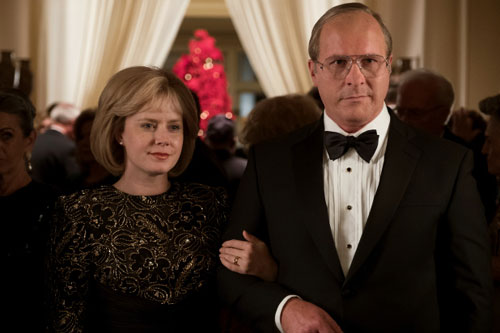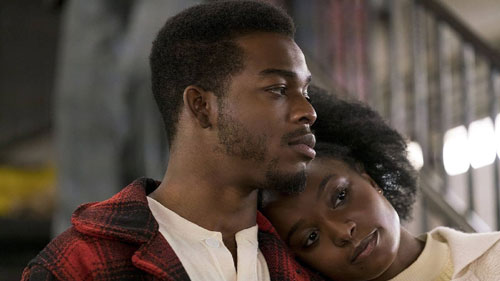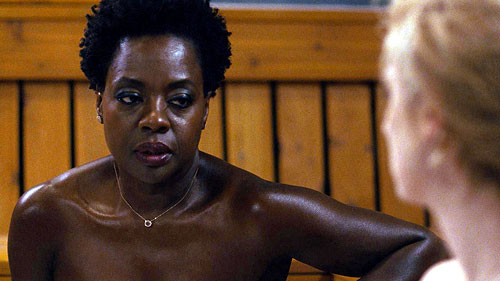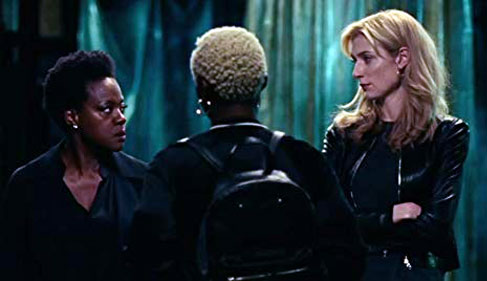|
Three recent films—Adam McKay’s Vice, Barry Jenkins’ If Beale Street Could Talk, and Steve McQueen’s Widows—offer sobering appraisals of American life through the prism of film. Vice is the most cynical, If Beale Street Could Talk the most lyrical, and Widows the most grittily realistic. But all three offer rewards beyond the average movie—far beyond, in the case of the latter two.
A freewheeling and nonlinear presentation of the life of Dick Cheney, Vice contains in its title a half-joking pun on the position Cheney held throughout the eight years of George W. Bush’s presidency. Stylistically and thematically, Vice is of a piece with McKay’s earlier film, The Big Short, which concerned the collapse of the U.S. housing market, and the resulting recession, late in the Bush administration. Covering by necessity a much longer period of time and many more incidents than The Big Short, Vice lacks the concentrated punch of the earlier film. Even more than The Big Short, it also preaches to a very specific political choir. But for members of that choir, Vice offers pleasures ranging from hilarious to acrid, as well as witty dialogue and superb performances.
Vice presents a panoramic view of the last fifty-odd years of American history as seen through the career of Cheney (Christian Bale). The narrator is Kurt (Jesse Plemons), a Middle East war veteran whose significance to the story is revealed only at the end.
We first see Cheney in 1963 as a brawling, hard-drinking lineman in his native Wyoming, his drinking having forced him to drop out of Yale. On the job, Cheney sees one of his fellow linemen fall from a pole and break his leg. The bosses drive him into town, give him five dollars and leave him there. Cheney takes this as an object lesson, which he applies faithfully throughout his subsequent career in government.
Early on, Cheney’s ambitious fiancĂ©e Lynne (Amy Adams) gives him an ultimatum: either straighten up or lose her. Cheney outwardly chooses the former, though deep down he never changes—not from when he begins in the Nixon White House as an assistant to economic advisor Donald Rumsfeld (Steve Carell), to becoming chief of staff under Gerald Ford, to congressman from Wyoming, to defense secretary under George H.W. Bush, and finally to vice president under George W. Bush (Sam Rockwell). Cheney’s philosophy remains the same throughout: take control as soon as you can, never let go of it, and do unto others before they do unto you.

Christian Bale’s portrayal of Cheney goes well past physical transformation—as amazing as it is—to capture what really seems to be the totality of the man. That totality, as closely as I can describe it, is a combination of gruff folksiness, insinuation, and naked menace. The scene of Cheney negotiating with Bush 43 to join the presidential ticket—well disseminated in the ads for the film—exemplifies everything we have come to believe about the man’s Machiavellian nature. It also exemplifies everything we have come to believe about Bush, none of it flattering, though Rockwell does make Bush goofily likable.
Vice is an uneven but bracing series of set pieces illustrating whatever aspects of Cheney’s character McKay deems germane; he even gives Cheney and Lynne a faux-Shakespearian bedroom speech, a’ la Lord and Lady Macbeth. “Macbeth” is the operant metaphor for Vice, as Cheney gradually surrenders everything he loves—even, in the end, his own daughters—to his insatiable ambition. Just as Cheney is transformed, so America is transformed in his image, with “talking points” and “focus groups” reframing the political debate to his purposes. A final scene that appears in the middle of the closing credits leaves no doubt of that. Vice is often an exciting film to watch, but you won’t leave the theater feeling happy.
You also won’t be happy at the end of If Beale Street Could Talk, but you will be moved and even uplifted. Barry Jenkins’ follow-up to his beautiful, Oscar-winning debut film Moonlight, If Beale Street Could Talk—based on the 1974 James Baldwin novel--presents the star-crossed love of Fonny (Stephan James) and Tish (Kiki Layne), two young residents of 1960s Harlem.

Fonny and Tish have known each other since childhood. They have been in love with each other for nearly that long. Tish is carrying Fonny’s child, and at the film’s beginning, walking through an autumnal park, they have pledged to spend their lives together.
“You ready for this?” Tish asks.
“I’ve never been more ready for anything in my whole life,” Fonny answers.
Unfortunately, nothing prepares Fonny and Tish, or the audience, for the next scene in Jenkins’ nonlinear screenplay. Tish is talking to Fonny through the glass partition in a prison, into which Fonny has been thrown for a rape he didn’t commit.
If Beale Street Could Talk is a sadly familiar story, boiling down in the end to the actions of one racist cop who is representative of the entire so-called justice system. But in Jenkins’ hands, the film is much less about injustice than it is about the love between Fonny and Tish, and their family’s love for them—which, of course, serves to make the injustice infinitely more bitter.
Jenkins’ Oscar-winning debut feature, Moonlight, was a poetic love story that had as its subtext the poverty and racism suffered by its protagonists. If Beale Street Could Talk, just as beautiful a film, has the racism front and center. Around the film’s midpoint, Fonny runs into his old pal Daniel (Brian Tyree Henry), who has just been released from prison. Listening to Daniel’s harrowing tales of mistreatment, Fonny is appalled but slightly removed: surely this has no application to him! Unfortunately, as I said before, the screenplay skips around in time; we have already seen how Daniel’s experience applies emphatically to Fonny.

Fonny and Tish’s plight has nearly as horrible an effect on their families as on Fonny and Tish themselves. We see it most clearly with Tish’s mother Sharon (Regina King, first among equals in a splendid ensemble cast). The two most moving set pieces in the film belong to Sharon. In the first, she gives a piece of her mind to Fonny’s snobbish, pious mother (Aunjanue Ellis), who explicitly thinks her baby is far too good for Tish. In the second, Sharon prepares to meet with the woman who accused Fonny of rape, to try to persuade her to recant. She stares in a mirror, trying on a wig; the look of helpless sorrow on her face will haunt you for days.
Jenkins alternates scenes of tragedy and injustice with scenes of lyrical beauty as enthralling as in Moonlight. Cinematographer James Laxton and composer Nicholas Britell, who added so much to the earlier film, work the same magic here. Essentially, If Beale Street Could Talk shows how life can go on, and people can grow stronger, even as the world at large conspires completely against them. The soul-chorus version of “My Country ‘Tis of Thee” that plays over the closing credits can be taken equally as affirmation and as the bitterest irony, encapsulating the African-American experience all by itself.
Widows also encapsulates a certain kind of American experience, no less persuasively and with even more bitterness.
In the tradition of heist movies such as The Asphalt Jungle and The Killing, Widows—with a screenplay by McQueen and Gillian Flynn, based on a British miniseries written by Lynda LaPlante—offers an all-encompassing portrait of corruption high and low. Set in modern-day Chicago, the story concerns Veronica Rawlings (Viola Davis), a teacher’s union rep married for years to Harry (Liam Neeson), a career criminal. Harry is killed in a heist with three of his cohorts; this is tragedy enough for Veronica, but nothing compared to what happens when Jamal Manning (Brian Tyree Henry), a crime boss seeking to go legit by winning an election for alderman, pays her a surprise visit. Harry and his gang died stealing $2 million of Jamal’s money, and now the money is missing. Jamal wants it back, or else. I don’t have it, Veronica says. You get it, Jamal answers.

Desperate for any solution, Veronica finds it in a notebook left by Harry, outlining in detail a $5 million heist. She contacts the widows of the other gang members. One of them, Amanda (Carrie Coon), does not immediately respond—no fair saying why--but the other two, Linda (Michelle Rodriguez) and Alice (Elizabeth Debicki) have overriding reasons to want to join Veronica in the caper. A couple of horrifying plot twists later, the women find it necessary to recruit Belle (Cynthia Erivo), Linda’s babysitter, who turns out to have the skills and the moxie the other women need.
Meanwhile, the corruption continues in multiple layers of rot. Jamal uses his psychopath brother Jatemme (Daniel Kaluuya) to get rid of various inconvenient people. Jack Mulligan (Colin Farrell), Jamal’s opponent in the election, wants to chuck the whole thing, but Tom (Robert Duvall), Jack’s power-broker bully of a father, strong-arms him into staying in the race.
Widows immerses us in a milieu of total criminality in which everyone is compromised. Some characters are hateful, some sympathetic, and we sympathize with the latter not because of their actions, but because of their motives. Those who want to steal wealth and power by any means necessary are pitted against those who merely want their lives back. When we see Linda lose her store because of her boyfriend’s theft, or Alice’s mother Agnieszka (Jacki Weaver) try to persuade her of the joys of prostitution as a profession, we feel these women have the right to take drastic measures to achieve their freedom.

The movie keeps us at rapt attention, never slacking off for a second, and every twist of the plot feels correct and earned. Widows strikes me as one of the best crime films ever made, and one of the best films of any kind of the past several years. The ensemble cast alone is extraordinary, with a crew of genius-level actors all working at the top of their game. Yet it was shut out of the Oscar nominations, and—worst of all—the Screen Actors Guild overlooked it in its nominations for Best Ensemble Cast. Why has Widows been so ignored? Perhaps awards voters have confused it with Ocean’s 8, a pleasant but inconsequential women-centered heist film from earlier in the year that was vastly more popular at the box office. Or perhaps it was just a victim of Hollywood groupthink, in which the unspoken consensus was that other films were more “worthy.”
In any case, Widows is a film that rewards repeated viewing. The film is an intricate portrait of a corrupt society that leaves no one unsoiled, and—especially in our own severely compromised time—it is totally persuasive.
|